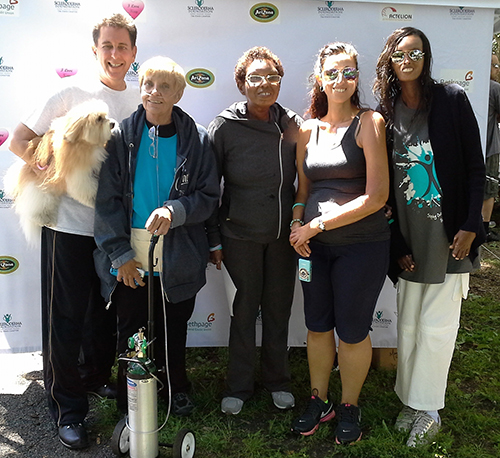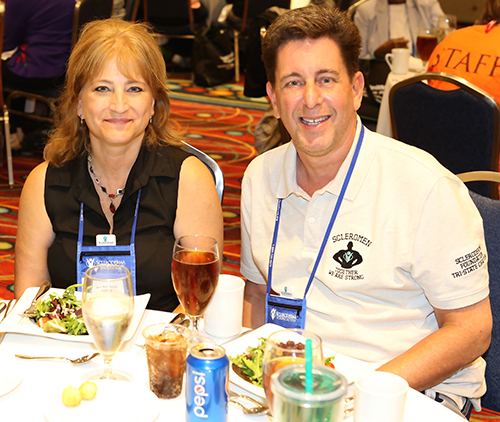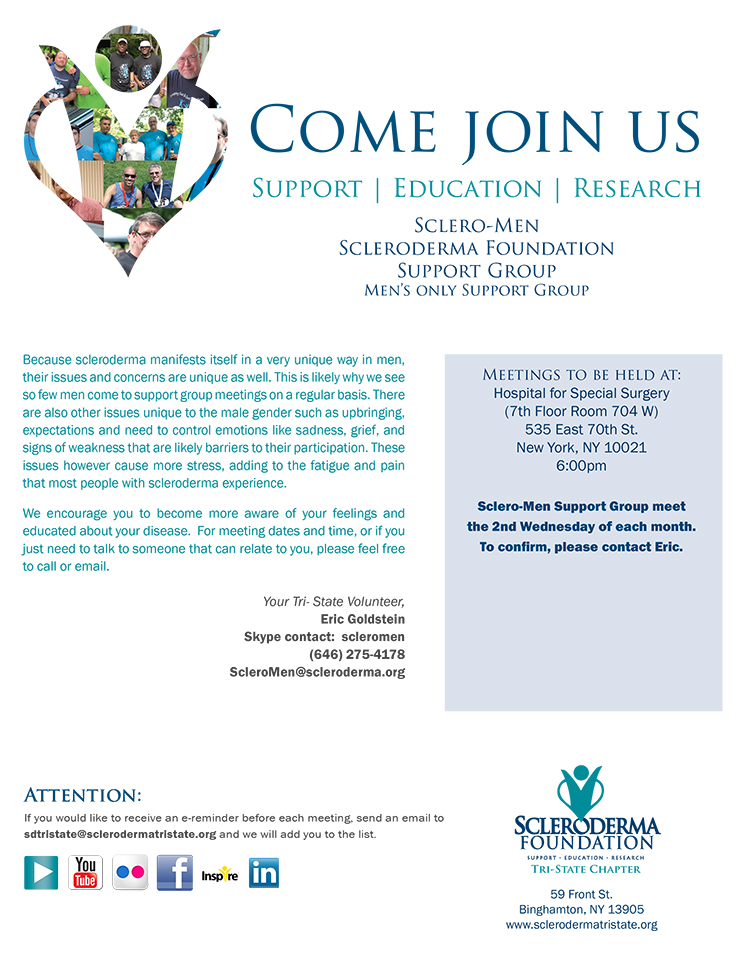|
Eric Goldstein: LEARN! LISTEN! LIVE OUT LOUD! Eric Goldstein is the founder and group leader of SleroMen, an outreach program for men living with scleroderm, through the Tri-State chapter. He spoke recently with "Scleroderma Voice" correspondent Jocelyn Bailey to discuss his journey and why he's fighting to help more men living with scleroderma.
EG: In the 70s, I watched my mother fight the good fight in helpless ignorance, trying to survive life with scleroderma, though she did not know at the time what illness she was fighting. In the beginning of her battle, my mother was told that her problems were hormonal/emotional/change-of-life issues and that she should learn to relax more and perhaps see a psychologist. It took several years before she found a physician who realized what was happening and diagnosed her with scleroderma. At the time, few, if any, physicians had heard of scleroderma, and even those who had heard of it did not know how to treat it. My mother was strong-willed and never backed down if challenged, but over time, she was no longer capable of fighting back and lost her life. My mother gave me the gift of life, a strong will, determination and a sense of self. I am fortunate that I inherited these traits as I now find myself fighting the same good fight with scleroderma, including the same form of the disease, diffuse systemic sclerosis sine. I am stubborn, tenacious, a natural-born fighter, and I rarely, if ever, give-in (nor would you expect me to.) Despite all that this disease has done to me and has taken away from me, here I am. You can be sure that I have no intention of falling off my perch anytime soon. JB: How has scleroderma changed you?
EG: I discovered how strong I am as a person but learned to recognize and accept my weaknesses, too. My world changed in giant steps, especially after my heart attack. Having a heart attack made me feel more vulnerable than I could have ever imagined; I felt as though I was in a downward spiral, just waiting to go down the drain. There were times I felt that my life was destroyed, and it has taken time to adjust to my new life. One of the best decisions I made was to bring a puppy into my life, something I had wanted to do for a long time. I finally convinced my spouse to agree to it. Despite the difficulties that come with a puppy, the joy a puppy can bring is wonderful. Our dog is now 2.5 years old, and as I answer the questions for this article, she is sitting in my lap acting as my editor. Having to learn to accept living with a chronic illness has given me a new focus on life, wanting to get as much as I can from it. I am more aware of how precious life is and how important it is to take advantage of each day. JB: Where do you find the greatest support?
EG: Support comes from my spouse, my daughter, my son-in-law plus wonderful lifetime friends. Since joining the Tri-State Chapter, I now have new, wonderful and supportive friends, some of whom I speak with daily. Despite the misfortunes of my illness, I have learned how many people are there for me, even without asking. JB: What made you start ScleroMen? EG: After my diagnosis, I learned that there is little information and support for men with scleroderma. The focus is on women due to the larger number of women who are diagnosed. Studies of men with diffuse systemic sclerosis consistently show they have higher rates of morbidity and mortality, which have me wondering, “Why?” So far, I have not been able to ascertain any additional information as few studies are done about men. Men have difficulty expressing themselves and reaching out because of societal views of what a man should be. I want to change that mind-set. Those who know me well can tell you that I am not one to back down, but I began to find myself shutting down and it had me wondering, “How many other men with scleroderma experience this?” All of this led me to beginning the ScleroMen group. JB: Being your own advocate is such a large part of being a patient, what are your thoughts? EG: First, my motto is: “Speak Up! Speak Out! Stand Up! Stand Out!” I cannot emphasize the importance of learning and being your own advocate. If you do not understand something, ask. Perhaps, we need to change our approach to how we learn? Perhaps, the medical community needs to change how it presents itself? If someone asks how you feel today, tell them. Jaws drop when I tell people how I really feel. They have no idea how to respond, so I go on my way thinking, “Don’t ask me if you do not want the truth.” JB: How has getting involved with the Tri-State Chapter changed your daily life?
EG: There is a need for people to try to understand by learning and asking questions about scleroderma can affect someone physically, emotionally and mentally. Unfortunately, this is a challenge, especially when dealing with a relatively unknown chronic illness. The first step into educating others about scleroderma is to have more hard-hitting public awareness campaigns. How can we ask someone to understand something they have never heard about? The only way this can be achieved is through public awareness and ongoing education. JB: What are your words of encouragement for those with scleroderma? EG: Embrace your fear and then throw it out to the world. Realize that you cannot always control your disease, but you can control how you deal with it. ScleroMen: Support Group for Men Only Because scleroderma manifests itself in a unique way in men, their issues and concerns are also distinct. This is likely why we see so few men coming to support group meetings on a regular basis. Many men were taught as children to control emotions such as sadness, grief and other signs of “weakness,” which likely presents a barrier to their participation. These issues can cause more stress, which adds to the fatigue and pain that people living with scleroderma experience. The ScleroMen Support Group encourages men to become more aware of their feelings and learn about the disease. Meetings are held at the Hospital for Special Surgery in New York City. Upcoming meetings are scheduled for November 12 and December 10, 2014. For additional information, please contact Eric Goldstein, support group leader, at (646) 275-4178 or ScleroMen@scleroderma.org. You also can reach him via Skype at “scleromen.” If you would like to receive an e-reminder before each meeting, please send an email to sdtristate@sclerodermatristate.org and ask to be added to the communication list. |
|
|
|||
Back
Understanding Scleroderma
Back
Treating Scleroderma
Back
Living Well with Scleroderma
Back
Advancing Research and Treatment
Back
Get Involved




 JB: Tell me about yourself and your
journey with scleroderma.
JB: Tell me about yourself and your
journey with scleroderma.


